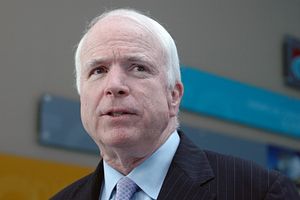Senior United States Senator John McCain visited India this Wednesday, meeting with India’s Foreign Minister Sushma Swaraj. They are reported to have discussed ways to enhance the Indo-U.S. strategic partnership and the situation in Iraq and Afghanistan. McCain is expected to meet Prime Minister Narendra Modi on Thursday.
The Republican Senator from Arizona is known to be tough on defense and strategic issues and is seen as favoring an increasingly assertive India and greater U.S.-India cooperation on a variety of issues.
Senator McCain has long advocated for friendlier ties between India and the United States. Last week he told the U.S. Senate that Washington should seek to help India’s economic and military development. He has also urged the U.S. Congress to invite Modi to address a joint session of Congress, an honor reserved for only a few foreign leaders. Modi is expected to visit the United States in September, while U.S. Secretary of State John Kerry is expected to visit India at the end of this month.
McCain is also interested in increasing defense ties between the two countries. India has recently indicated that it plans to allow greater foreign investment in its defense industry. Additionally, according to a recent study by the government of the United Kingdom, India’s defense spending is set to accelerate over the next 30 years to match that of the United States and China. McCain’s Arizona is host to some of Boeing and Raytheon’s largest defense businesses and it would be a win-win situation for the United States, Arizona, McCain, and India if India were to make military purchases from these companies.
U.S.-India relations, however, have a long way to go. Relations were strained last year due to a row over the arrest of an Indian diplomat in New York. McCain’s recent visit has been overshadowed by a row between the two countries over reports that the U.S. National Security Agency (NSA) spied on India’s ruling Bharatiya Janata Party (BJP) in the past. The BJP was one of only six political organizations around the world to be spied on by the NSA.
There is a widespread feeling in India that President Obama did not capitalize on the bonhomie built up between the two countries by former President George W. Bush. Obama is seen as having neglected relations with India. Oddly, for such an important country, the United States currently does not have an ambassador in India. Senator McCain criticized this trend, arguing that President Obama should have been more proactive in reaching out to the new BJP government and should have extended an invitation for Prime Minister Modi to visit the U.S. earlier.
Nonetheless, as was discussed earlier on The Diplomat, despite the Chinese government’s attempt to focus primarily on economic issues with Narendra Modi’s government, India is still strategically wary of China. As a result, India will continue to cultivate stronger relations with the United States. Strategic trends in Asia make it difficult for the two countries to remain at loggerheads for too long, as they both need each other. India needs the U.S. to shore up its strategic position in the region and for military modernization, while the U.S. can benefit from India’s geostrategic position and the economic liberalization the Modi government is planning to undertake.

































